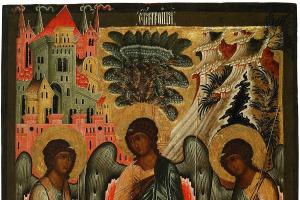There are crops that are little known to gardeners, and in some cases, many are not aware of them at all. Some crops can even grow close to the site, attracting attention unusual appearance, but also remaining little known. Exactly like this unusual plant You can call wormwood tree - God's tree.
Description of culture
Some have heard the name of the plant wormwood; the culture is a perennial. Wormwood is common in temperate climatic zones, but the most comfortable place Dry areas of the planet are considered for its active growth.
God's tree is distinguished by its attractive leaves, as well as a pleasant smell that can repel some harmful insects. The culture has long been mentioned in medical prescriptions and is used to decorate city parks, summer cottages and flower beds. There are separate evergreen varieties, as well as those that lose their lush foliage in autumn.
The plant reaches a height of 1.2 meters. There are other names: abrotan, decorative wormwood and dill tree. Wormwood has been actively growing in Ukraine, Belarus and Russia for many decades. This plant was first mentioned at the beginning of the 12th century in the Ipatiev Chronicle. Due to its special medicinal properties, the culture is widely used in the medical field. Gardeners love this plant for its unusual and attractive shape.
Plant characteristics
Wormwood can quickly adapt to areas with increased dryness, grows on high hills or sandy soils, quickly spreads along the banks of streams and rivers. In science, there are about 250 varieties of this crop. They are used by landscape designers to create unusual compositions.
Features of dill tree:

Popular types and varieties
The culture is distinguished by its diversity; many of its varieties exhibit particular resistance to low temperatures. God's tree, which is referred to as medicinal types, is known in almost all European countries. Main plant types:

Even in ancient times, such a plant grew in the territories of temples; it was grown mainly by monks. To properly store wormwood leaves, they need to be finely chopped and placed in an airtight container. With this method, the culture will not lose its pleasant aroma.
The following medicinal compositions can be prepared from the plant:

Excessive consumption results in intoxication of the body.
To create a medicinal decoction from a plant, one part of the dried herb is poured with boiling water and placed on the fire to boil. The broth is left for thirty minutes, and then filtered through cheesecloth. The finished product can be drunk 50 grams before lunch.
Features of cultivation
Planting and caring for wormwood is not particularly difficult if the plant is not grown for its decorative qualities. This grass grows well in almost any soil mixture, excluding sand. Wormwood responds positively to cold weather and winters with little snow. But some conditions are optional right place It is still important to take into account the growth of culture. This will help the plant grow better and bloom more beautifully.
God's tree prefers places with high level exposure to the sun, so for growing plants it is best to choose the south side of your summer cottage. This can be explained by the fact that dill herb belongs to the group of southern crops. In addition, the plant reacts negatively to strong cold winds.
The plant will feel best in a row between trees or other shrubs. It is also important to take into account that trees can block the sun's rays.

Wormwood requires well-moistened soil. Before landing on open ground It is important to fertilize it with mineral as well as organic substances. A crop can continue to grow in one place for about twelve years, after which it needs to be transplanted to a new area. Grows well among perennial herbs and annual plants. Negatively relates to soil with a high level of acidity.
Planting in the soil
It is best to propagate a dill tree by cuttings or dividing the bush. It is better to use cuttings for planting that are two years old and fully mature. The plant is planted in a moist soil mixture (before planting, the soil should be watered warm water). It is advisable to plant in mid or late April. At this time, the soil is well moistened, so the seedling can quickly and efficiently take root, even if it is not watered.
The seedlings of the crop can be placed in a container with water for one week, and then planted in the ground. In water, the cuttings form the first young rhizomes. Afterwards they begin to actively grow throughout the ground.
The seeds of the tree of Christ can germinate even after 70 years from the moment they were collected. The total length of the cuttings that will be planted in the soil should range from 10 to 15 centimeters. It is important to leave a distance of up to one and a half meters between plantings so that the shrubs can grow quickly and efficiently. When planting in the soil, seedlings can be fertilized with humus and constantly watered during the first two weeks of cultivation.
In some flower shops you can find wormwood tree seeds ready for planting. They are needed for growing seedlings. Since this plant grows in warm regions, it is best to plant it in separate containers and place it on a windowsill where sunlight will always fall. After the seedling grows to 15-20 centimeters, it is allowed to be transplanted to country cottage area.
Many gardeners say that abrotane grows quickly and does not require special care. Some even forget about this culture, but it continues to grow and does not die. But to create an attractive, graceful shrub, caring for the plant is important.
A dill tree that is grown for decorative purposes does not need to be watered. Watering is carried out only in the first days after planting in the ground. To preserve all the decorative qualities of the plant, it can be watered on warm summer days once every fourteen days. Each bush will require about four liters of water at room temperature.
Fertilization with useful substances
 Tree wormwood still requires care after planting in the ground. Such procedures will not take too much time. In some cases, aphids appear on the foliage of the plant. In this case, the plant must be sprayed with special anti-insect preparations. Can also be used for spraying laundry soap, diluted in a bucket of water. To do this, take 250 grams of soap per 10 liters of water. Spraying is carried out several times at weekly intervals.
Tree wormwood still requires care after planting in the ground. Such procedures will not take too much time. In some cases, aphids appear on the foliage of the plant. In this case, the plant must be sprayed with special anti-insect preparations. Can also be used for spraying laundry soap, diluted in a bucket of water. To do this, take 250 grams of soap per 10 liters of water. Spraying is carried out several times at weekly intervals.
Weeds may grow near the bushes, which are important to regularly eliminate. The soil is weeded to provide more nutrients and minerals to the plant's roots. You can also sprinkle several handfuls of chola under the bush. Before the winter season, abrotan should be mulched. If desired, the soil next to the bush is sprinkled with humus.
Caring for such a crop also includes regular pruning. It is best to choose spring for such a procedure, when all the cold has already gone and the weather has returned to normal.
Shoots of annual shrubs need to be cut back by four centimeters. It is best to pinch the tops of wormwood to ensure better growth for the shrub. On a mature shrub, you need to cut off last year's growth as often as possible to rejuvenate the crop, you can cut off the shoots.
Shrub division
This propagation method is best used in the spring, in April. To do this, the bush is dug up. Afterwards, the unnecessary soil is carefully shaken out from the roots, and the crop is divided into several parts (depending on how much is needed). Each part should be quite large, since plants with a small root system often do not take root and simply die.

After division, each crop is planted in separate holes. Before planting in the soil, it is best to water the soil and add fertilizer. For the next two weeks, the separated bushes are watered regularly. Watering can be completed only after strengthening the root system of the seedlings.
Wormwood, also called tree of God or Chernobyl, is known for its medicinal properties. The ancient Greeks discovered that wormwood is very effective in treating cuts and wounds. Noticing this, they began to add this medicinal plant to ointments. Wormwood has about four hundred varieties, two hundred of which can be found in Russia. Only medicinal wormwood grows everywhere, which is the most popular type of God's tree.
Description and Application
Tree of God is a perennial herb that has small white or yellow flowers. The plant belongs to the Asteraceae family. The bush has a thick root and reaches a height of one and a half meters. The plant has a tart odor, and the leaves have a shape reminiscent of dill. These leaves contain many different essential oils. Wormwood has a bitter taste, which is due to the high concentration of lactones in it. Medicinal wormwood has found wide use in folk medicine and cooking.
Harvesting God's tree grass should be done in the summer. It is advisable to collect and harvest the plant from July to September. The collected leaves should be spread out on newspaper or burlap and placed in a dark, dry place away from drafts.
Used as a remedy silver look bitter wormwood. The use of this medicinal plant is very versatile.
For various injuries (dislocations or bruises), it is recommended to apply compresses with a decoction of wormwood to the affected areas. An alcohol tincture of this plant is effective in treating inflammation of the periosteum. Tea and decoction of wormwood are useful for overwork and insomnia, and also help relieve tension, fatigue and migraines. Thanks to his medicinal composition Wormwood is an excellent remedy against hypertension. Wormwood helps to normalize the menstrual cycle in women. Its role in the prevention and treatment of cancer is great. The healing properties of this medicinal plant help improve the functioning of the gastrointestinal tract and get rid of heartburn. The plant serves as a strong anthelmintic. But in this case, the treatment must be properly prepared (information on this below).

Harm and contraindications
When consuming wormwood, you should be careful and avoid overdose, which can cause serious harm to the body. Before you start taking products based on this plant, you must consult your doctor about methods of administration and dosage. You should not take products based on God's tree in the following cases:
- 1. Pregnancy and lactation. The use of wormwood decoctions is strictly prohibited for women during pregnancy, as this can negatively affect the health and development of the unborn child.
- 2. Anemia, stomach and intestinal ulcers.
- 3. The appearance of nausea and vomiting.
- 4. Individual intolerance and allergic reactions.
Treatment with wormwood should last no more than a month; prolonged use or overdose can lead to convulsions and hallucinations.


Recipes for various diseases
1. Cold.
An oil infusion of wormwood is used to treat colds. The pottery needs to be filled with leaves and flowers of the plant and poured olive oil. Place the container with the composition in a cool, dark place for ten days, then strain. The readiness of the product is determined by its color: it should turn dark green. You need to take the resulting oil one teaspoon at a time. Indications for use are influenza, sore throat, ARVI.
2. Gastrointestinal diseases.
Wormwood tea is useful for treating such diseases. To prepare it, you need to take one tablespoon of a dry mixture of leaves and flowers and pour a glass of boiling water over it. The tea is brewed for fifteen minutes and should be drunk four times a day. This tea serves as an excellent immunostimulant and is useful in winter time. Tea made from wormwood and yarrow is useful to restore appetite. To prepare it, you need to take half a tablespoon of both components and pour a glass of boiling water. You need to drink half a glass of tea three times a day on an empty stomach for a week.
3. Worms.
To prepare anthelmintic tea, you need to mix dry wormwood and cloves in equal quantities. You need to take 1 tsp in the morning and evening. powder with carrot juice. Wormwood removes the worms themselves, and cloves destroy their larvae. The course of treatment is ten days.
4. Skin diseases.
You need to take a dark plastic container, pour dried flowers of the tree of God into it and fill it with olive oil. Dark color utensils are necessary to prevent light from reaching the oil. The container must be sealed and left in a dark place for two weeks. The resulting product should be taken one teaspoon three times a day on an empty stomach.
5. Oncology.
Lady's tree tincture is effective in the treatment of oncology early stages. The root of the plant is used to prepare the medicine. Dry finely chopped root should be filled with water and boiled for ten minutes in a covered pan. After this, the infusion must be removed from the heat and allowed to cool without removing the lid. Tightness must be observed to prevent the essential aroma and oils from evaporating. You need to take two tablespoons of this infusion before meals. The course of treatment is two weeks, after which it is necessary to take a month break.
6. Menstrual irregularities.
Fresh leaves must be poured with boiling water and left for thirty minutes. As soon as your period begins, you need to take two tablespoons of the infusion three times a day. Within three months, the pain decreases significantly, and the cycle becomes more regular.

Use in cosmetology and to strengthen hair
Wormwood disinfects facial skin well, makes it smooth, helps remove blackheads, pimples, blackheads, and demodex. A steam bath for the face is very useful. To do this, you need to take one tablespoon of finely chopped wormwood and pour a liter of boiling water. It is necessary to cover your head with a terry towel and expose your face to the steam. The duration of the procedure depends on the skin type. For dry skin, three minutes is enough, for normal skin – five, and for oily skin, ten minutes. At the end of the procedure, the face should be rinsed with cool water.
God's tree or dill tree, perhaps, can be included in the list of the most rare perennials in the garden. Botanical name (Artemisia abrotanum) is medicinal wormwood or abrotan. You can see what the tree of God looks like in the photo - it is a subshrub up to 1.2 m high with silvery, pinnately dissected leaves. The culture is unpretentious, with correct landing and care, overwinters in open ground. IN decorative purposes minor pruning required.
God's tree: origin and description
Medicinal wormwood, high or lemon, grows in the wild in the south of Europe, in Asia Minor, in North America. It is found in the southwest of Russia and in the Altai Territory. Prefers damp places, forest edges. Often forms dense thickets along roads and abandoned housing.
The shoots of the plant are directed strictly upward and do not branch. Flowering in mid-latitude conditions occurs in mid-summer (July, early August). Abrotane inflorescences are formed by small baskets, in place of which seed pods are set in the fall. The fruits fully ripen only in the southern regions. Therefore, most often, dill trees are propagated vegetatively.

God's tree - a medicinal plant
The first mention of the plant dates back to the 5th century AD. In his botanical works, this type of wormwood was described by the ancient physician P. Dioscorides. Scientists believe that from this time it began active use wormwood medicinal in cooking, medicine and for decoration. There are also records of the holy tree in the Ipatiev Chronicle, dating back to 1201.
Young shoots of abrotan have a bright dill aroma with an admixture of pine needles and citrus, older shoots acquire bitter wormwood notes.
Planting abrotan and care in open ground
For successful growth, a dill tree needs a place with a good portion sunlight. The southern plant does not tolerate drafts well and needs protection from the wind; it is better to plant it along a building or fence. In such an area, the shrub will quickly grow a green top and overwinter more easily.
The soil is prepared nutritious, loose, well-drained.
Attention! God's tree does not grow in acidic soil.
They dig up the bed, add rotted compost and manure. For 1 sq. m will require 6 kg of organic matter. From minerals:
- 25 g superphosphate;
- 15 g ammonium nitrate;
- 15 g of potassium chloride.
The holes are formed at a distance of at least 1 m from each other. After planting, young plants are watered, in the first days they monitor the condition of the soil and do not allow it to dry out or become waterlogged. Three more feedings will be required during the season. The latter is done late autumn, adding organic matter to the site.
For ten years, medicinal wormwood does not need to be transplanted. In addition to watering, the plant requires weeding, loosening the soil, and pruning damaged branches.
Wormwood cuttings are carried out at the beginning or end of summer. Cuttings rooted in June are planted in open ground no later than August. This is necessary so that the plants can get used to new conditions and get stronger. In the first winter, dill tree seedlings are covered with film or agro-fabric. The following year, the wormwood will overwinter on its own.

Protect the plant from drafts
If the branches were cut at the end of summer, then it is better to leave them in the house for the winter. A cool veranda or glassed-in loggia is well suited for this. It is quite possible that the wormwood will shed its leaves, this is not a big deal, new shoots will grow from the buds in the spring.
Attention! Winter watering of medicinal wormwood is kept to a minimum.
Dill tree in folk medicine and cooking
The leaves and stems of abrotan contain:
- Essential oil.
- Bitterness.
- Abrotanine alkaloid.
Thanks to this composition, the plant is widely used for medicinal purposes. Homeopathic doctors prepare essences that relieve certain skin diseases and anemia. Antiseptic, hemostatic and analgesic effects have been proven.
Dry powder from the aerial part of the tree of God is applied to abscesses, bruises, and dislocations. For inflammation of the oral cavity and toothache, use the tincture for rinsing. Based on the rhizome, powders are made against epileptic seizures and tuberculous meningitis.

Lady's tree twigs are used in cooking
Medicinal wormwood is used not only in medicine. It is also a natural air freshener. The cut branches are dried and hung indoors. In addition, green young shoots of abrotan are an original spice for meat and fish dishes. Cooks used it to flavor sauces, broths, vinegar, and added it to baked goods and liqueurs.
Advice. Dill tree branches are used in bath brooms.
For medicinal purposes, harvesting is carried out before the wormwood begins to bloom. Soft branches are cut and dried in a dry and dark place. Store in tightly closed containers.
Abrotane in landscape design
The tree of God is not only useful, but also an incredibly decorative crop. Lush bushes in the garden medicinal wormwood planted in flower beds. The fast-growing crop is used as a living fence and as a border along paths and alleys. The tart smell will repel insect pests, and the silvery foliage will “dilute” flower plantings.
Abrotane also combines with other perennials. Tall plants will protect heat-loving wormwood from the wind, the main thing is that there is no excessive shading of the dill tree. The spherical bushes of medicinal wormwood will look decent next to the flowering ones:
- hydrangea and roses.

God's tree in landscape design
You can place several species of different flowering times nearby. Thus, the composition will always attract attention.
Quite often, gardeners form a tree of God in the shape of a cypress; the cone-shaped crown and carved foliage make the plant even more similar to southern conifers.
Abrotane is also used for landscaping terraces, open verandas, balconies. Wormwood is planted in wide flowerpots or containers.
Wormwood abrotan, or, as it is popularly called, God's tree, is one of those plants that has long been used in medicine and cosmetology. The benefits of this bitter herb, its known medicinal properties and contraindications for use will be discussed in the article. Photos of the plant and tips on its use in folk, that is, alternative medicine, will help you get to know it better.
What does wormwood look like and what does it contain?
Wormwood is a well-known crop that grows in nature almost everywhere: in forests, gardens, meadows, wastelands, etc. There are a lot of varieties of it. They differ from each other appearance and the content of chemical compounds. Botanists describe Abrotan as follows:
- A perennial subshrub belonging to the Aster family.
- Its height can be from 90 to 120 cm.
- The growth of almost completely lignified shoots is directed vertically. Their diameter is about 1.5 cm. They have no branches.
- The leaves are compound, pinnately dissected, gray-green in color. Their lobes are very thin, almost thread-like, which gives them an openwork appearance.

God's tree can often be found in nature
- Yellow inflorescences in the form of small baskets are located on drooping peduncles. They appear in July-August.
- The fruits of the tree of God are achenes.
- The rhizome of the subshrub is taprooted and goes far into the soil.
- All parts of the plant are endowed with a strong aroma. Some compare it to the smell of pine needles, lemon and dill at the same time.
- In nature, wormwood abrotan is found near the shores of various bodies of water. Gardeners use it as an ornamental plant.
Attention! You can collect the plant yourself only in environmentally friendly places.
God's Tree contains the following substances:
- abrotanin alkaloid;
- essential oil;
- tannins;
- bitter substances;
- vitamins A, B, C;
- organic acids and resins.
The benefits of abrotane and significant contraindications for use
Preparations from wormwood can have a significant effect on the human body:

Remedies from wormwood actively affect the human body
- The substances contained in the plant normalize the excretion of bile and increase the production of digestive juices in the stomach.
- God's tree preparations can relieve spastic pain.
- They have an antifungal effect.
- In some cases, they act as an antipyretic.
- Help eliminate inflammatory processes and quickly heal wounds.
- Have a positive effect on nervous system.
- When used as cosmetic product Abrotane preparations, due to the presence of tannins, eliminate unaesthetic shine and “force” the sebaceous glands to work normally.
Separately, we can say about the benefits of the tree of God for the female body:
- The plant can stop heavy bleeding during menstruation.
- Relieves pain symptoms during menstrual bleeding.
- Wormwood preparations normalize the condition of the body during menopause.
- This herb is used as an aid in the treatment of genital infections in women.
Attention! Before taking wormwood preparations, you should definitely consult your doctor.
There are a lot of contraindications to taking God's tree preparations, because the plant has a strong effect on the human body. The main ones are:
- chronic and acute diseases Gastrointestinal tract;
- insufficient amount of hemoglobin in the blood (anemia);
- pregnancy;
- Children should not take medications.
Signs that you should immediately stop taking medications are nausea and vomiting. These signs indicate individual intolerance.

Before starting treatment with wormwood products, be sure to consult a specialist.
How to prepare wormwood yourself and what preparations you can prepare at home
Wormwood is harvested during the flowering period of the plant. To do this, cut off the upper parts of the stem and dry them in a well-ventilated, shaded place.
Attention! To avoid weathering of essential substances, the dry plant should be stored in a hermetically sealed container, preferably made of glass, for no more than 2 years.
Examples of some alternative medicine recipes
- Wormwood oil abrotan. For this preparation you will need a fresh plant, recently cut. I'm completely filled glass containers, after which they fill it with oil (preferably olive oil). The drug is infused in a dark place for two weeks. Afterwards it is filtered. Used externally for skin diseases and internally for colds and bronchitis.
- A decoction to improve appetite. Here they use a mixture of wormwood and yarrow (1:1). The finished collection, in the amount of 2 tsp, is poured with 2 tbsp. boiling water. They insist for half an hour. Take 1 tbsp 30-40 minutes before meals.
Advice. If the drug is unbearably bitter, it is better to drink it through a straw.
- Infusion to normalize the menstrual cycle. 1 tsp wormwood is poured with a glass of boiling water. Leave under a tightly closed lid for about 40 minutes. Take 1-2 tbsp during a malfunction. before eating.

God's tree helps people in the treatment of many diseases
- A wonderful remedy is a bath procedure using a broom made from wormwood branches. After it, muscle tension goes away and headaches are significantly reduced.
God's tree - amazing plant, which sometimes grows just under your feet. But only after consulting a doctor, and only with the correct use of drugs made from it, you can not harm, but significantly improve the condition of some organs and the entire body as a whole.
The plant God's tree or Chernobyl plant is known to everyone under the name wormwood - this is the name it received among the people. This shrub belongs to the Asteraceae family.
We invite you to find out whether God's tree has medicinal properties and contraindications, how to use it correctly for medical purposes, does it only bring benefits or can it cause harm?
The medicinal properties of this plant were learned back in Ancient Greece- then its leaves began to be used to treat wounds and cuts, adding them to ointments. She is so helpful thanks high content it contains citral (it is this that gives these citrus notes in the aroma), tannins, ascorbic and organic acids, glycosides, flavonoids, salts of the element potassium, carotene and other various macroelements.
God's tree is a storehouse of medicinal properties. The ancient people gave it several more names: Crimean or Taurian wormwood, lemongrass, holy tree, etc.
Contraindications to the use of God's tree include pregnancy and breastfeeding. It is strictly forbidden for pregnant women to use any decoctions, because... this can have a bad effect on the health and development of the fetus.
The use of wormwood for anemia is also not recommended. Most doctors consider nausea and vomiting to be contraindications for the use of God's tree. Treatment with this herb should be avoided in case of individual intolerance or allergic reactions of the human body. Use should be limited to a month, so that there are no convulsions or hallucinations from an overdose.
Medicinal wormwood is perennial grass, which blooms with small white or yellow flowers. It has a very tart aroma, and its leaves resemble dill leaves in appearance and contain a large number of essential oils. God's tree is very often used in folk medicine, cooking, in everyday life, and is grown in gardens and vegetable gardens as an ornamental or indoor plant. You can find out about wormwood recipes for treating oncology here:
The silvery type of wormwood is also used in medicine. But whatever you call it, its medicinal properties remain the same. Decoctions from this useful herb treat diseases of the oral cavity, the remedy can also be used to get rid of infections in the throat.
Tincture of wormwood is widely used to wipe the skin for dermatitis, and it is also used for hair care - rinsing the hair and scalp after washing.
God's tree is a very healing drug that has more than one use:
The decoction is used to treat sprains/bruises - compresses are applied to the affected areas. Medicinal wormwood treats inflammation of the periosteum - take the substance in the form of an alcohol tincture. Will help relieve tension, fatigue, headaches. It is recommended to drink tea and tea for insomnia and fatigue. Its lemon scent promotes sound sleep.
The medicinal composition of the plant helps to cope with hypertension. You won’t be able to get rid of it completely, but wormwood will remove the symptoms in no time.
God's tree grass should be prepared in the summer. You can start collecting and harvesting from mid-July and finish in September. Green leaves are dried in a dark, dry place without drafts on a spread newspaper or burlap.
Health Benefits of God's Tree
With the help of God's tree and its medicinal properties, you can improve the functioning of the gastrointestinal tract, get rid of pain from heartburn, sore throat. But here you need to properly prepare a decoction, tincture or tea. How exactly to do this and what recipe to choose for treatment various diseases we'll tell you a little later.
So many folk recipes collected using this wormwood species paniculata. And all because this asteraceous plant with lacy foliage contains a lot of useful vitamins, medicinal properties and acids.
You should also use wormwood with caution - it not only brings health benefits, but can also cause harm if overdosed. You should definitely consult your doctor to prescribe correct treatment and application, told how to drink the herbal tincture.
God's tree contains little bitterness, so it can also be taken by children (we will talk about contraindications for use a little later).
Useful properties of God's tree

The healing properties of wormwood have been known since ancient times. But now it is used not only to treat diseases, but also in other areas. How to choose the right variety of wormwood for decoctions and tinctures, what ingredients a face mask from God’s tree should contain, what recipes for tinctures exist to get rid of worms or improve appetite - read on.
Recipe for wormwood for colds
Wormwood is used to make oil for colds. The recipe is very simple. You need to take a clay vessel and completely fill it with flowers and leaves of God's tree. Fill it with olive oil to the brim of the vessel.
The resulting product needs to sit for about 10 days so that the oil is saturated with the healing properties of wormwood. The composition must be filtered after time and consumed 1 tsp. with sore throat, group or ARVI. How to determine that the oil has begun to have healing properties - it should change color to dark green.
God's tree tinctures for gastrointestinal diseases
Wormwood tea will help cope with diseases of the stomach, intestines, duodenum and so on. Pour 1 tablespoon of dry/fresh herb (leaf and flowers can be mixed) into a glass of water, preferably boiling water.
Wait until it brews for about a quarter of an hour. Tea should not only have medicinal properties, be beneficial, but also smell very pleasant. Application: how to drink? 4 - 5 times a day.
It is very useful to drink it in winter - the body will gain strength to fight infectious diseases.
Benefits of Ladybug Leaf for Skin and Hair
Tincture, decoction or mask - effective remedy in the fight against hair loss, increased oiliness, dandruff, it will add volume and restore shine to dull locks. Recipe for rinsing broth: tbsp. Pour boiling water over the herbs and cook over low heat for about five minutes. Remove from heat, strain and add 1 liter of water. Use after every hair wash.
How to care for hair that is falling out? You can make a mask from God's tree. She has no contraindications (except allergic reactions) and by-effect You are not in danger. Pour a glass of light beer and 2 tbsp into the pan. wormwood. Bring the mixture to a boil, cool, and apply to individual strands of hair and scalp. Exposure time: 20 minutes.
Famous recipe against hair loss:
In henna white add wormwood until a paste forms. This mask should be done once a week. It is applied to the hair, covered with polyethylene and left for an hour. The effect from the previous mask will be different - the hair will become more voluminous.
In order to prepare facial lotion from the herb and leaves of the tree of God, you need to take a tablespoon. base, salt 0.5 teaspoon and a spoonful of viburnum.
Recipe description:
leave the wormwood in a glass of boiling water for half an hour, add the rest of the ingredients. An ordinary lotion will help get rid of acne. This folk tincture can also cure scars on the skin of the face. Store for no more than 14 days refrigeration chamber.
We suggest using wormwood ice cubes to relieve inflammation and smooth out fine wrinkles. Freeze the broth in ice cube trays and wipe the skin morning and evening.
Ladybug leaf tea for health recipes
A recipe for yarrow and lady's tree tea will help restore your appetite. Half a tbsp. Mix herbs in a glass with boiling water. Strain.
How to drink? Drink 100 g three times a day on an empty stomach. You can take it for a week, after which it is recommended to take a break so as not to harm the human body.
Lady's tree root tincture: indications for use
Tincture of lady's tree (also called widow's bush or Austrian bush) is widely used in the treatment of cancer in the initial stages. It is the wormwood root that is the main ingredient here.
Finely chop the dried root, add water and boil for 10 minutes under a closed lid. This rule exists so as not to affect the quality of the future infusion - the essential smell and oils may evaporate. Remove from heat and let the tincture cool with the same lid closed. Strain the solution.
How to drink? – 2 tbsp. on an empty stomach for two weeks. After which you need to take a break for a month. This correct use will not cause an overdose and will not cause harm.
Lady's tree oil for skin diseases
The top part of the herb is poured into a dark plastic container (so that light does not fall on the oil), filled with olive oil, sealed with a lid and left for two weeks in a dark place.
Strain the solution and store in the refrigerator. Take half a teaspoon orally before meals three times a day.
Decoction of lady's tree leaves for cancer
A decoction of wormwood leaves is not used to combat cancer; for this purpose, wormwood root is crushed.
A decoction of the leaves of the tree of God will perfectly help cope with an unstable menstrual cycle. To do this, pour boiling water over fresh leaves and leave for half an hour.
When menstruation occurs, take 2 tablespoons 3 times a day. The cycle will become less painful and stabilize within 3-4 months.
Planting and caring for God's tree
What do you need to know when planting a plant in a garden or vegetable garden? Wormwood is a very unpretentious herb. There are few places where it does not take root.
How to plant God's tree correctly? Planting is carried out on a sunny plot of land. The best soil is light and nutritious; if desired, you can fertilize poor soil.
Growing does not take much time - the shrub reproduces quickly, does not require special care, and can be used as a living fence.
Growing Austrian bush requires constant watering of the soil. Requires pruning of lower branches. Blooms from July to September. The good thing about growing wormwood is that you can prepare and dry its leaves yourself for further use.
fitohome.ru
God's wormwood tree - medicinal properties and contraindications

Wormwood - a bitter herb - is well known for its bitterness: everyone remembers how in childhood, after picking a leaf of this plant, you had to immediately run to wash your hands. But this same bitterness, which contains wormwood - the tree of God, has medicinal properties and is extremely useful.
Composition of wormwood
In addition to the well-known bitterness, which, by the way, is contained in varying quantities in different types plants, wormwood contains a set of vital amino acids, a large amount of essential oils rich in vitamins B, A, C.
IN chemical composition The plant contains tannins, which have an astringent effect, as well as potassium, which has a beneficial effect on the functioning of the heart.
Useful properties of the plant
It is interesting that the wonderful properties of wormwood are used by both folk and official medicine.
- Medicinal wormwood - the tree of God is used in the treatment of cancer; for this, a decoction is prepared and taken in accordance with the recommendations.
- Baths with wormwood infusion are used in the treatment of neuroses; they are also indicated for gout and inflammation of the joints.
- Kidney stones are expelled with the help of a preparation that uses wormwood oil; it helps turn stones into sand, is a wonderful antispasmodic, quite a strong diuretic and mild laxative.
- Wormwood - the tree of God - has found its use in the treatment of helminthiasis. It actively expels helminths from the body, while providing a general strengthening and tonic effect.
- Known for her beneficial influence on the state of the body in diseases of the gastrointestinal tract and various infections.
- Wormwood is also used for external use: a decoction of wormwood leaves is used in the form of compresses in the treatment of boils and other purulent formations.
God's tree - wormwood has medicinal properties and contraindications for use. It is not recommended to use plant preparations during pregnancy and breastfeeding. In addition, there are limitations to its use in anemia. You should not use wormwood preparations without a doctor's recommendation, as an overdose can cause convulsions and hallucinations.
Related articles:
| Lingonberry - medicinal properties and contraindications Lingonberry is a berry that is widely used in nutrition and treatment. Everyone knows lingonberry jam; A tasty and healthy sauce is prepared from it, which is used as a seasoning for meat dishes. In addition, lingonberries are used as a medicine. | Three-leaf watch - medicinal properties This inconspicuous plant is well known in folk medicine and has several more unusual names: consumptive grass, fevergrass, river lapushnik, female toadgrass, beangrass. In the official catalog medicinal plants it is called the three-leaf watch. |
| Amur velvet - medicinal properties Today we will talk about velvet. True, we will not find out what style of dress can be made from it, but what healing properties it has, because we mean rare plant, growing in the Far East. | Bogorodskaya grass - medicinal properties and contraindications This amazing plant has several names, one of which is Bogorodskaya grass, which binds it beneficial features with a divine effect on humans, especially since its healing properties were already known to representatives of ancient civilizations. |
womanadvice.ru
lady tree medicinal properties and contraindications, photos, use in folk medicine
 Wormwood abrotan, or, as it is popularly called, God's tree, is one of those plants that has long been used in medicine and cosmetology. The benefits of this bitter herb, its known medicinal properties and contraindications for use will be discussed in the article. Photos of the plant and tips on its use in folk, that is, alternative medicine, will help you get to know it better.
Wormwood abrotan, or, as it is popularly called, God's tree, is one of those plants that has long been used in medicine and cosmetology. The benefits of this bitter herb, its known medicinal properties and contraindications for use will be discussed in the article. Photos of the plant and tips on its use in folk, that is, alternative medicine, will help you get to know it better.
What does wormwood look like and what does it contain?
Wormwood is a well-known crop that grows in nature almost everywhere: in forests, gardens, meadows, wastelands, etc. There are a lot of varieties of it. They differ from each other in appearance and content of chemical compounds. Botanists describe Abrotan as follows:
- A perennial subshrub belonging to the Aster family.
- Its height can be from 90 to 120 cm.
- The growth of almost completely lignified shoots is directed vertically. Their diameter is about 1.5 cm. They have no branches.
- The leaves are compound, pinnately dissected, gray-green in color. Their lobes are very thin, almost thread-like, which gives them an openwork appearance.
 God's tree can often be found in nature
God's tree can often be found in nature - Yellow inflorescences in the form of small baskets are located on drooping peduncles. They appear in July-August.
- The fruits of the tree of God are achenes.
- The rhizome of the subshrub is taprooted and goes far into the soil.
- All parts of the plant are endowed with a strong aroma. Some compare it to the smell of pine needles, lemon and dill at the same time.
- In nature, wormwood abrotan is found near the shores of various bodies of water. Gardeners use it as an ornamental plant.
Attention! You can collect the plant yourself only in environmentally friendly places.
God's Tree contains the following substances:
- abrotanin alkaloid;
- essential oil;
- tannins;
- bitter substances;
- vitamins A, B, C;
- organic acids and resins.
The benefits of abrotane and significant contraindications for use
Preparations from wormwood can have a significant effect on the human body:
 Remedies from wormwood actively affect the human body
Remedies from wormwood actively affect the human body - The substances contained in the plant normalize the excretion of bile and increase the production of digestive juices in the stomach.
- God's tree preparations can relieve spastic pain.
- They have an antifungal effect.
- In some cases, they act as an antipyretic.
- Help eliminate inflammatory processes and quickly heal wounds.
- Have a positive effect on the nervous system.
- When used as a cosmetic product, abrotane preparations, due to the presence of tannins, eliminate unaesthetic shine and “force” the sebaceous glands to work normally.
Separately, we can say about the benefits of the tree of God for the female body:
- The plant can stop heavy bleeding during menstruation.
- Relieves pain symptoms during menstrual bleeding.
- Wormwood preparations normalize the condition of the body during menopause.
- This herb is used as an aid in the treatment of genital infections in women.
There are a lot of contraindications to taking God's tree preparations, because the plant has a strong effect on the human body. The main ones are:
- chronic and acute gastrointestinal diseases;
- insufficient amount of hemoglobin in the blood (anemia);
- pregnancy;
- Children should not take medications.
Signs that you should immediately stop taking medications are nausea and vomiting. These signs indicate individual intolerance.
 Before starting treatment with wormwood products, be sure to consult a specialist.
Before starting treatment with wormwood products, be sure to consult a specialist. How to prepare wormwood yourself and what preparations you can prepare at home
Wormwood is harvested during the flowering period of the plant. To do this, cut off the upper parts of the stem and dry them in a well-ventilated, shaded place.
Attention! To avoid weathering of essential substances, the dry plant should be stored in a hermetically sealed container, preferably made of glass, for no more than 2 years.
Examples of some alternative medicine recipes
- Wormwood oil abrotan. For this preparation you will need a fresh plant, recently cut. The glass container is completely filled with it, after which it is filled with oil (preferably olive oil). The drug is infused in a dark place for two weeks. Afterwards it is filtered. Used externally for skin diseases and internally for colds and bronchitis.
- A decoction to improve appetite. Here they use a mixture of wormwood and yarrow (1:1). The finished collection, in the amount of 2 tsp, is poured with 2 tbsp. boiling water. They insist for half an hour. Take 1 tbsp 30-40 minutes before meals.
- Infusion to normalize the menstrual cycle. 1 tsp wormwood is poured with a glass of boiling water. Leave under a tightly closed lid for about 40 minutes. Take 1-2 tbsp during a malfunction. before eating.
 God's tree helps people in the treatment of many diseases
God's tree helps people in the treatment of many diseases - A wonderful remedy is a bath procedure using a broom made from wormwood branches. After it, muscle tension goes away and headaches are significantly reduced.
God's tree is an amazing plant that sometimes grows just under your feet. But only after consulting a doctor, and only with the correct use of drugs made from it, you can not harm, but significantly improve the condition of some organs and the entire body as a whole.
God's tree - wormwood: video
dachadizain.ru
God's tree

After reading this article, you will learn what beneficial properties God's tree contains, and we will also teach you how to use God's tree and use it healing properties. You will also find out what contraindications there may be when consuming God's tree.








